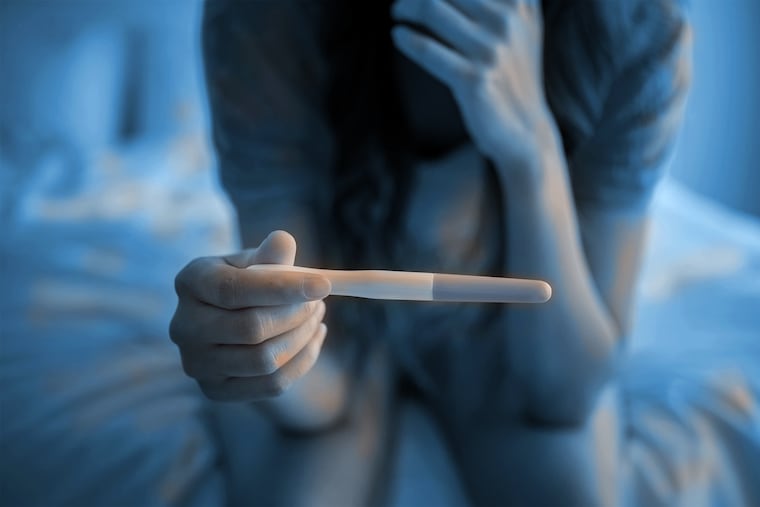Mother’s Day is hard when you’re struggling to become a mom. Here’s my story.
Finally, after a long wait, I am pregnant. But I will spend the holiday thinking of those like me, for whom this day often brings nothing but pain.

Each Mother’s Day for the last four years, I’ve thought, “I really hope I’ll be a mom by next year.” And for years, it hasn’t happened.
Finally, after a long wait, I am pregnant. But I will spend the holiday thinking of those yearning to be a mom, wishing they could give their child a sibling, mourning a lost baby, or those who are childless not by choice.
And the grief, pain, and medical procedures it took to become a mother will stay with me — as will the heartbreak I felt at seeing Mother’s Day card displays, the times that walking by an aisle of baby items at Target made me cry, and the many days I was too sad to leave the house.
» READ MORE: Can we cancel Mother’s Day, please? | Opinion
Since Mother’s Day 2020, my husband and I have endured one early pregnancy loss, countless medical tests and doctors visits, and four rounds of in vitro fertilization — each of which involved giving myself shots for two weeks to stimulate my ovaries, then having surgery to remove my eggs and fertilize them with my husband’s sperm.
Five different times, doctors inserted an embryo created via IVF into my uterus. Each time, the pregnancy test was negative. The sense of loss was overwhelming. I’d cry for days, and I lost trust in my own body.
Infertility affects one in six people, and one in four pregnancies end in miscarriage. So even if you haven’t dealt with infertility, chances are you know someone who has. And for an experience that is so common, our society doesn’t talk about it nearly enough.
So I’ve decided to start talking about it.
Infertility affects one in six people.
Our diagnosis was “unexplained infertility,” which means testing found no reason why we could not conceive. We were both in our early 30s, healthy, and seemingly fertile. IVF and other treatments don’t guarantee success, which isn’t something I understood when I started. After repeated failures, doctors concluded I suffered from poor egg quality.
I felt defective.
I watched the lives of people around me move forward while I remained stuck in grief. Friends had two or three babies while I racked up medical bills and bad news.
But I didn’t talk much about it, so to most people, I lived a double life — rushing to doctors’ appointments before work, taking 20 minutes to cry when I received bad news before hopping on my next Zoom call, and smiling politely when someone complained about sleepless nights with their toddler or asked if I wanted kids.
When others announced pregnancies, I tried to express joy, but each time, I was devastated. My husband and I withdrew from friends, unable to bear discussing day cares or attending baby showers.
My inability to feel happy for my friends brought guilt and shame on top of my immense sadness. With the help of therapy and support groups, I learned these feelings are perfectly normal for anyone experiencing infertility. One study often cited by experts found that women with infertility have the same rates of depression and anxiety as those with cancer, HIV, and other life-threatening conditions.
But not all friends and family whom we told about our struggle understood. Some shared stories of acquaintances who got pregnant once they stopped trying, suggested my stress was contributing to the problem (it wasn’t), or proposed adoption, which we weren’t ready to consider, or surrogacy, which I didn’t need. Others said nothing at all.
The best support came from those who remembered important dates for procedures or test results and checked in, sent me cards or flowers when I got bad news, and stopped sharing happy updates about their own babies when it was too hard for me to hear. They didn’t offer unsolicited advice or shy away from my sadness; they just listened. I grew closer to friends who were also undergoing IVF and befriended strangers in support groups.
But the years dragged on, and eventually, even my infertile friends got pregnant and transitioned into motherhood. My husband and I discussed a potential life without kids. Could we be happy? I didn’t know.
Last year, we turned to egg donation. Thanks to that option, I am now pregnant with a child who gets half his DNA from my husband and the other half from a donor who went through IVF herself to help us.
While I don’t share genes with my baby, I am his mother. I can nurture him in my womb, bring him into the world, and offer him all of my love. I will tell him the story of how he came to be, and explain he’s the child we were waiting for all along. I can’t wait to get to know him and teach him the biggest lesson I’ll take from this journey: Be kind, because you never know what someone is going through.